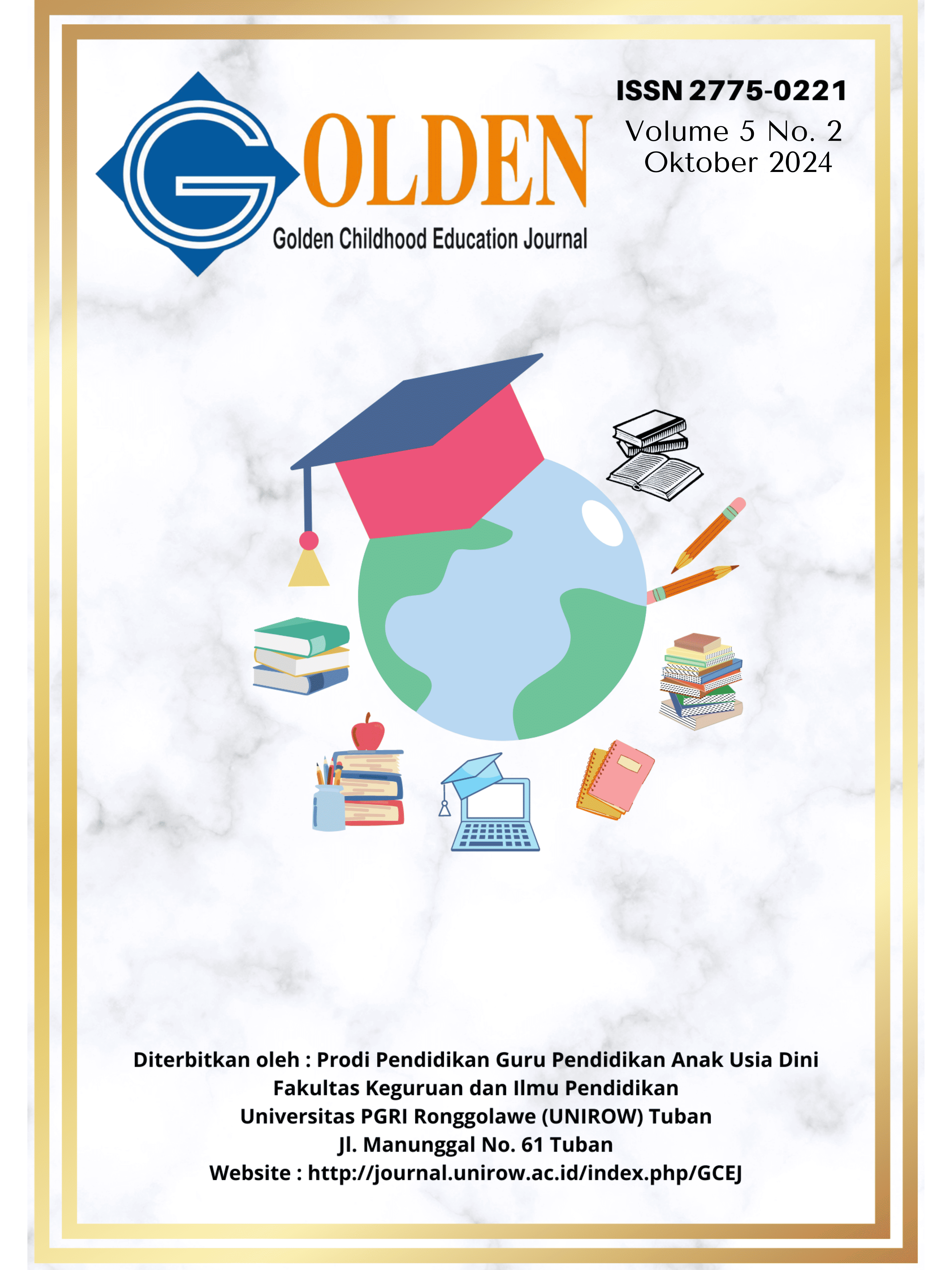IMPLEMENTASI KETERLIBATAN ORANG TUA DALAM MODEL EPSTEIN DI CENDEKIA KIDS SCHOOL MADIUN
DOI:
https://doi.org/10.55719/gcej.v5i2.1552Keywords:
Involvement, Parents, Epstein ModelAbstract
Parental involvement in early childhood education is a process or way for families, especially parents, to participate and play a role in organizing education to achieve goals. According to experts, there are several models for parental involvement, one of which is the Epstein model. Epstein frames six forms of parental involvement: parenting education, communication, volunteering, learning at home, decision-making, and community collaboration. The benefits of parental involvement in early childhood education are that parents gain knowledge regarding child development, the relationship between parents and teachers is well established, and the school's image is good. Parental involvement indeed cannot be separated from supporting and inhibiting factors. This research aims to determine parent involvement in the Epstein model at Pakar Kids School. The subjects of this research were the principal, teachers, and parents at Pakar Kids School. This research method uses a qualitative approach with a field research type. Research location at Pakar Kids School. Data collection techniques through interviews and documentation. The data analysis technique for this research uses the Miles and Huberman model, namely data reduction, data presentation, and concluding. The research results show that the Epstein model of parent involvement is relevant to parent involvement at Pakar Kids School, which takes six forms: parenting education, communication, volunteering, learning at home, decision-making, and collaborating with the community. Supporting factors for parental involvement are school readiness and the relationship or communication that exists between parents and teachers. Meanwhile, the factors inhibiting parental involvement are parental education and employment.
Downloads
References
Mulyasa, Manajemen Paud. Jakarta: Gramedia, 2015.
R. N. Anwar and N. Azizah, “Pengasuhan Anak Usia Dini di Era New Normal Perspektif Islam,” Thufuli J. Ilm. Pendidik. Islam Anak Usia, vol. 2, no. 2, pp. 1–9, 2020.
R. Diadha, “Keterlibatan Orang Tua Dalam Pendidikan Anak Usia Dini Di Taman Kanak-Kanak,” Edusentris, vol. 2, no. 1, p. 61, 2015, doi: 10.17509/edusentris.v2i1.161.
A. Vinayastri, “Perkembangan Otak Anak Usia Dini,” J. Ilm. WIDYA, vol. 3, no. 1, pp. 33–42, 2015.
R. N. Anwar and Y. D. Cristanti, “Peran Pendidikan Anak Perempuan Dalam Membentuk Masyarakat Madani,” J. Care, vol. 6, no. 2, pp. 11–18, 2019.
R. N. Anwar, “Keterlibatan Orangtua dalam Membentuk Disiplin Ibadah Sholat Anak Usia Dini di Era New Normal,” in KoPeN: Konferensi Pendidikan Nasional, 2021, pp. 1–7.
A. P. Noerviana, D. R. Afifah, and R. N. Anwar, “Keterlibatan Orang Tua di Lembaga PAUD,” in Seminar Nasional Sosial Sains, Pendidikan, Humaniora (SENASSDRA), 2024, vol. 3, no. 3, pp. 279–283.
E. Purwandari, “Peningkatan Keterlibatan Orang Tua Dalam Pendidikan Seks Anak,” War. LPM, vol. 21, no. 2, pp. 143–151, 2018, doi: 10.23917/warta.v21i2.6651.
J. L. Epstein, School, family, and community partnerships: Preparing educators and improving schools, second edition. 2018. doi: 10.4324/9780429494673.
R. N. Anwar, “Parents ’ Involvement In The Quran Education In Early Childhood During The Covid-19 Pandemic,” in International Seminar on Islamic Religion (ISoIR), 2021, pp. 83–88.
E. I. Eliasa, “Pentingnya kelekatan orang tua dalam internal Working model untuk pembentukan karakter anak,” Dev. Psychol., vol. 33, no. 5, pp. 806–821, 2011.
M. S. Erlanti, N. Mulyana, and H. Wibowo, “Teknik Parenting Dan Pengasuhan Anak Studi Deskriptif Penerapan Teknik Parenting Di Rumah Parenting Yayasan Cahaya Insan Pratama Bandung,” Pros. Penelit. dan Pengabdi. Kpd. Masy., vol. 3, no. 2, pp. 237–247, 2016, doi: 10.24198/jppm.v3i2.13686.
D. Damayanti, D. R. Afifah, and R. N. Anwar, “Faktor Kemampuan Bantu Diri Anak Usia Dini yang Beraktivitas Bersama Orang Tua di Pasar Besar Madiun,” in Seminar Nasional Sosial Sains, Pendidikan, Humaniora (SENASSDRA), 2023, vol. 2, pp. 50–56.
L. D. A. Pagarwati and A. Rohman, “Grandparenting Membentuk Karakter Anak Usia Dini di Masa Pandemi Covid-19,” J. Obs. J. Pendidik. Anak Usia Dini, vol. 5, no. 2, pp. 1229–1239, 2020, doi: 10.31004/obsesi.v5i2.831.
U. Kamilah, J. Rihlah, F. K. Fitriyah, and M. Syaikhon, “Pengaruh Perilaku Kecanduan Gawai terhadap Perkembangan Bahasa pada Anak Usia Dini,” Child Educ. J., vol. 2, no. 2, pp. 61–67, 2020, doi: 10.33086/cej.v2i2.1685.
A. S. Ifadah and R. D. Permata, “Penerapan Pembelajaran Dengan Metode Montessori Dalam Membentuk Karakter Mandiri Anak Usia Dini,” Golden Child. Educ. J., vol. 5, no. 1, pp. 7–36, 2024, doi: 10.55719/gcej.v5i1.1146.
A. Alfina and R. N. Anwar, “Manajemen Sekolah Ramah Anak PAUD Inklusi,” Al Tanzim J. Manaj. Pendidik. Islam, vol. 04, no. 01, pp. 36–47, 2020.
I. Hatimah, “Keterlibatan Keluarga Dalam Kegiatan Di Sekolah Dalam Perspektif Kemitraan,” Pedagog. J. Ilmu Pendidik., vol. 14, no. 2, pp. 290–297, 2016.
S. I. Masitoh, S. Aisyah, and L. Karyawati, “Dampak Pola Asuh Orang Tua Pengganti terhadap Perkembangan Sosial Emosional Anak Usia Dini,” J. CARE (Children Advis. Res. Educ., vol. 10, no. 2, pp. 21–27, 2023.






